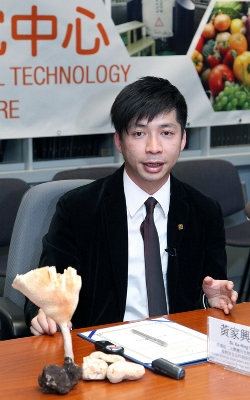Dr. Wong Ka-hing, who serves as Associate Director at the Food Safety and Technology Research Centre (FSTRC) of The Hong Kong Polytechnic University as well as an Assistant Professor at the university’s Department of Applied Biology and Chemical Technology, has used the polysaccharide-protein complex derived from the sclerotium of the African Tiger Milk mushroom to synthesize high-stability selenium nanoparticles that are capable of decelerating the breast cancer cell growth by apoptosis.
 Dr. Wong Ka-hing
Dr. Wong Ka-hing
For his research titled, ‘Preparation of Highly Stable Selenium Nanoparticles with Anti-Cancer Activity under a Food Grade Redox System,’ Wong has received the Young Investigator Award at the 2011 International Conference of Food Factors. It is the first study wherein mushroom polysaccharide-protein complexes are utilized as stabilizers for producing high-stability selenium nanoparticles. According to the study, the final products can be devoured as health products or functional food. In addition, the unique nanoparticles can also be used as a drug for chemoprevention of cancer.
Selenium nanoparticles demonstrate minimal toxicity, high bio-availability and powerful anti-cancer activity. However, these unique properties of nanoparticles are subjected to risk when the particles surpass their nano-size by forming aggregates. For this reason only researchers throughout the world have been studying methods to increase the stability of nanoparticles.
Wong will further extend his cancer research to understand the mechanism of anti-cancer activity of the highly stable selenium nanoparticles on breast cancer cells of small animals. He will also study the use of other developmental stages of Tiger Milk mushroom such as fruiting body in cancer research.